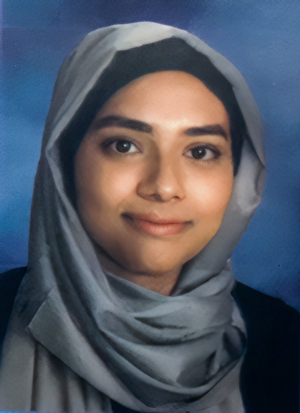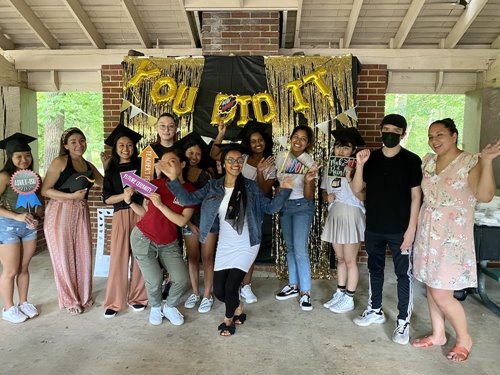Mahia Rahman has her train ticket. A graduate of Washington-Liberty High School in Arlington, Virginia, she is headed to Harvard in August, on her 18th birthday.
 Rahman always knew she wanted to go to college, and her parents were ready to support her any way they could. But navigating the U.S. system with its applications, loans, financial aid forms and costs was new to them. AHC Inc., a NeighborWorks nonprofit in Arlington, Virginia, offered a mentorship program to help. Along with community mentors who volunteer to look over essays, staff keep students abreast of deadlines and bring them together as a group.
Rahman always knew she wanted to go to college, and her parents were ready to support her any way they could. But navigating the U.S. system with its applications, loans, financial aid forms and costs was new to them. AHC Inc., a NeighborWorks nonprofit in Arlington, Virginia, offered a mentorship program to help. Along with community mentors who volunteer to look over essays, staff keep students abreast of deadlines and bring them together as a group.
This year, all 31 students in the College & Career Readiness Program will be headed to school in the fall. Some will go to community colleges in Northern Virginia. Others will go to James Madison, Virginia Tech, Old Dominion, Tufts, Harvard, Yale and more. All told, this year's group applied to 195 colleges and universities. They earned a total of $3 million in scholarships and gift aid.
 Like many of the students in the program, Rahman will be the first in her family to go to college, though her two younger sisters are close behind her. Her interest is computer science and social justice, and she'd like to combine the two "to help figure out which communities need what the most."
Like many of the students in the program, Rahman will be the first in her family to go to college, though her two younger sisters are close behind her. Her interest is computer science and social justice, and she'd like to combine the two "to help figure out which communities need what the most."
She's already something of a resident leader herself. At school, she started the Equity in Excellence club to help low-income and minority students navigate Advanced Placement and International Baccalaureate classes.
"Just being a part of the program was helpful," she says of AHC. Program organizers kept them abreast of what they should be doing when. And when she was nervous or feeling a lack of confidence about her applications, she would call on Milenka Coronel, assistant director of resident services, for emotional support. Her parents, both from Bangladesh, provided that support, too, especially when she was up all night working on applications or doing research.
It paid off. Rahman had a number of Ivy League options. She is spending this month sorting through her belongings, deciding what to bring with her to Massachusetts. "Most people tell me to bring the minimum," she says. "My parents want me to bring everything I own and more. But I can't take everything."
This year was an especially challenging one for AHC's readiness program, because everything was virtual. Mentors and mentees met via phone or Zoom. "As staff and mentors, we had to go above and beyond to connect with students and make sure the relationship is there," says Gabriela Segovia, AHC's College & Career Readiness manager. "They were getting motivation from every corner."
AHC offers workshops for their students with a focus on empowerment and motivation. "We tell them what to expect in college as a first generation, low-income student. I tried to give them my experience of college as a person of color and let them know that whatever challenges they have, there's nothing they can't overcome."
Staff members would get texts and calls from students each time a college replied. I just got my top choice. I just got a scholarship!
Tara Claeys, a web designer in Arlington, received similar notes as a program mentor. Claeys began volunteering with AHC three years ago, after her own children went through college. "I wanted to help other kids with the daunting college application process," she says. And the process is daunting -- especially for kids who are first learning about the American college system. "I hope the program helps students gain confidence in their future and leads them to a successful college experience."
This year, because of COVID-19, Claeys met her student on zoom each week, encouraging her to talk about interests as well as aspirations. Helping with college essays is a large part of the mentorship program. Claeys also helps the students sort through the spreadsheet of scholarship opportunities, providing the occasional reality check. "The competition is enormous," she says.
For many of the students, especially those who are the first in their family to go to college, there can be a lot of pressure. "They feel they have to be perfect," Segovia says. "They have to work a job, go to school, participate in an extra-curricular activity. A lot of them take care of siblings while their parents are at work. There is a lot of responsibility."
One-third of NeighborWorks America's nearly 250 network organizations have said they offer programs to support and encourage students, and many offer several, ranging from literacy programs and extracurricular activities to college readiness programs like this one. Lashanda Ellington, executive director of Project Discovery of Virginia, partners with nonprofits who host college readiness programs, including AHC. "I believe having that support daily and thinking outside the box is why AHC's program is so successful," she says. "They assist them with choosing the right classes. In a high school, it's 200 kids to one counselor, so having what is an extra extension of the counseling office is superb. They show the students what's expected. And just having someone say, 'it's feasible' makes a difference."
AHC plans to grow the program next year, expanding to properties in Alexandria, Virginia. "We want to help as many students as we can," says Segovia, who was inspired to work with students after forging her own path to and through college. "I wanted to let them know that nothing is impossible."
07/23/2021

